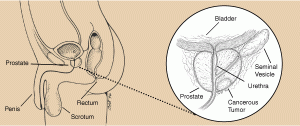Many men would just love to come home from the Doctor’s office with great news. This news would be… that an increase in sexually active may really prevent them from getting Prostate Cancer. Of course, the number one problem would be the validity of this information, whether it was true or not. Let’s dive into the two camps of thought.
First, let’s look at the Prostate itself. The prostate is a gland, an exocrine gland, of the reproductive system of men. Exocrine means that it secretes a chemical or hormone. In this case, it is an alkaline fluid that makes up a third of the fluid involved with semen that is produced within the prostate and then released. The prostate, along with the spermatozoa and seminal vesicle help create semen. For the prostate to work properly, you need androgens or male hormones. The primary hormone is testosterone.
In some cases the prostate can become a cancer. As illustrated in the picture above. Prostate cancer can be a seen in a large majority of men. Though often symptoms do not present themselves. A large amount of research has been done to look at possible prevention of Prostate Cancer.
Now back to the dilemma. The real problem is that in the past, there has been so much conflicting information on whether increase sexual activity can really prevent cancer of the prostate. Some have even hypothesized that sexual activity would lead to problems with the prostate, causing damage and even increasing the risk of prostate cancer. Often these cases deal with increased risk of infection and STD’s. But often the risks, in these studies, had little to do with the actual ejaculation process.
In other studies, they speculated that increased sex drive means increased male hormones and this increase is a risk, in of itself, for prostate cancer. Since hormones are associated with the function of the prostate, and hormones also seem to play a role in cancer, the two became linked. The jury seems to still be out on this aspect of the debate.
In 2005 it was produced through Johns Hopkins Medical Institution that a massive study, overlooked by epidemiologist Michael Leitsmann at Harvard. It appears that this was a decade long study. They studied nearly 30,000 men. Most of the men in the study where white, middle-aged, and very few had history of a sexually transmitted disease.
The main question asked was the typical number of ejaculations per month in their twenties, forties, and during the past year. This information, at least immediately, was minimally helpful. The group of men was followed for the next eight years. During the next eight years – 1,500 of the 30,000 went on to develop prostate cancer.
The findings were equally important to note. When men, on average, had more than 21 ejaculations per month for their lifetime, had ¼ or 25% the risk of men who reported few ejaculations per month (4-7).
Elizabeth Platz who also had difficulty with conflicting theories organized the Harvard study felt this study was more credible than other studies. She pointed out that they had asked questions, especially about average monthly ejaculations, prior to the diagnosis of prostate cancer. The other item is the large number of men that took apart in this study. The last item of importance was that the men in the study had been without a large amount of sexually transmitted diseases. This essential eliminated this risk from their group.
Additional studies have looked at the correlation of increased ejaculations with prostate cancer and have thus far found no relationship. Elizabeth Platz has indicated that the next step in her research will be to identify the protective reasoning behind increased ejaculations and prostate cancer.
It can be assured that new information may shed light on this debate. Even though a somewhat recent study has suggested that there is a link between sexual activity and decreased risk for prostate cancer. I feel that the debate will rage on. So, if your husband does suggest increased sexually activity to protect against sexually activity, you’ll know that the jury is still out. But, it might not hurt!
Protect your family with affordable health insurance. Use the form above to compare quotes and find great deals.



